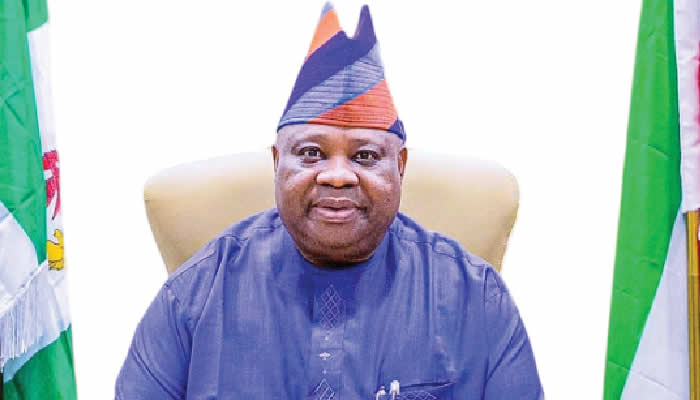The political landscape of Osun State has been abuzz with a controversy surrounding Governor Ademola Adeleke’s alleged attempted defection to the All Progressives Congress (APC). The Osun State chapter of the APC ignited the firestorm by claiming that Governor Adeleke, currently a member of the Peoples Democratic Party (PDP), had sought to join their ranks but was rebuffed due to conditions imposed by the APC’s national leadership. The APC asserts that Adeleke’s defection bid was driven by his perceived vulnerability within the PDP and his desire for a guaranteed gubernatorial ticket in the upcoming 2026 elections, a condition the APC was unwilling to meet. The APC further alleges that Adeleke’s denial of these claims at a PDP stakeholders meeting is a deceptive attempt to conceal his failed political maneuvering.
The APC has bolstered their claims by citing alleged behind-the-scenes efforts involving Southwest governors and influential industrialists who purportedly facilitated Adeleke’s defection attempt. They also referenced a supposed visit by Governor Adeleke to Chief Bisi Akande, a prominent APC figure, in Ibadan, Oyo State, further substantiating their assertion of his desire to switch allegiances. The party portrays Adeleke as akin to a “promiscuous housewife,” attempting to conceal her illicit activities, and suggests that his denial before PDP stakeholders is a desperate attempt to maintain a facade of loyalty. The APC’s narrative paints a picture of a governor whose political ambitions outweigh his commitment to his current party and who is willing to engage in clandestine negotiations to secure his future.
However, Governor Adeleke’s spokesperson, Olawale Rasheed, has vehemently denied these allegations, dismissing them as hallucinations and fabrications. Rasheed insists that there has never been any discussion, past or present, regarding Governor Adeleke’s defection from the PDP. He highlights Adeleke’s strong performance as governor, citing recognition from local, national, and international organizations, as evidence that he has no need to switch parties to secure re-election in 2026. Rasheed maintains that Adeleke enjoys overwhelming public support, reflected in an 80% job approval rating, and recently received an endorsement for a second term from Osun State workers. He frames the APC’s claims as a desperate attempt to distract from their own internal struggles and declining public image.
Rasheed further argues that Governor Adeleke’s focus remains on delivering good governance and protecting Osun State from what he describes as “desperate politicians” seeking to destabilize the state. He portrays Adeleke as a steadfast leader committed to the PDP and attributes the APC’s accusations to their envy of his administration’s achievements and popularity. Rasheed urges the APC to address its internal issues rather than resorting to baseless accusations against a successful governor. He concludes by reaffirming Governor Adeleke’s unwavering commitment to the PDP and asserts that the party will lead Osun State to continued progress.
This conflicting narrative presents a complex political drama, with each side offering contrasting interpretations of events. The APC paints a portrait of a governor desperate to jump ship, while the PDP portrays him as a steadfast leader untempted by the allure of the opposition. The truth likely lies somewhere in between these two extremes, with political maneuvering and strategic posturing playing significant roles. The public is left to decipher the motivations behind these conflicting claims, as the political battle for control of Osun State continues to unfold.
The fallout from this controversy is likely to have significant implications for the political landscape of Osun State. The accusations and counter-accusations have deepened the divide between the two major parties, further polarizing the political environment. As the 2026 gubernatorial election approaches, this controversy is sure to be revisited and exploited by both sides. The clashing narratives surrounding Governor Adeleke’s alleged defection attempt will undoubtedly influence public perception and potentially impact the outcome of future elections. The truth, as elusive as it may be, will likely emerge over time, but for now, the political theatre continues to captivate the attention of the Osun State populace.














